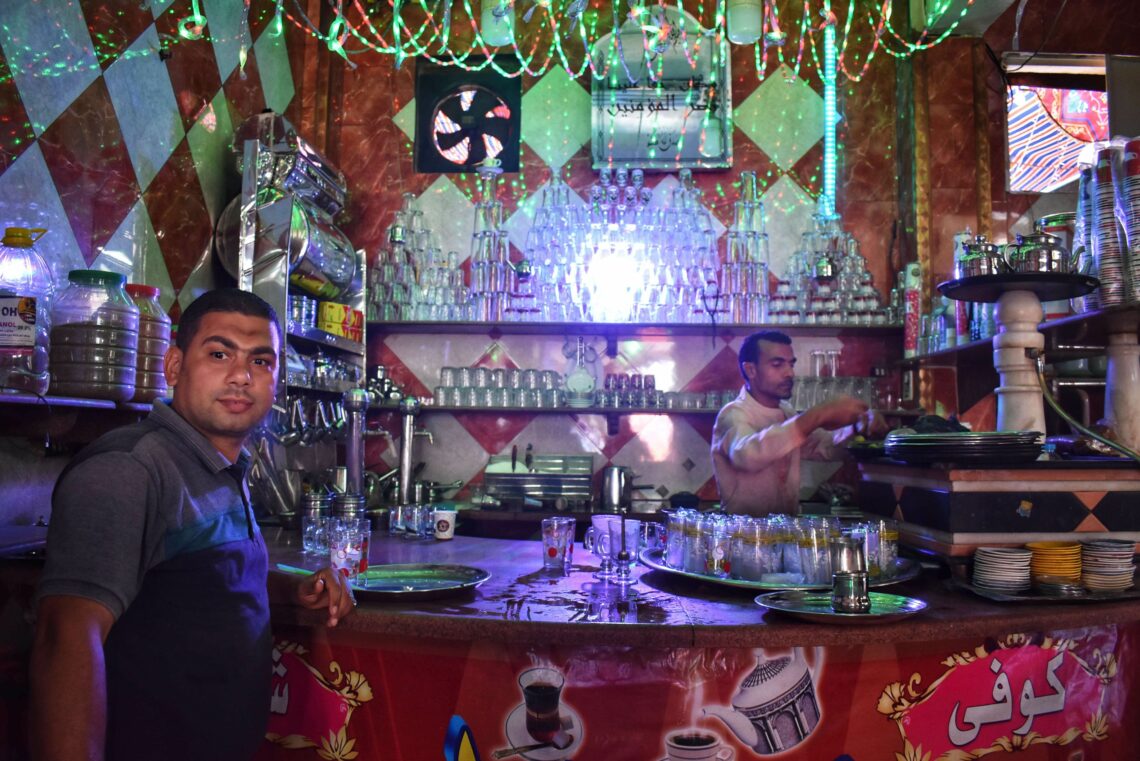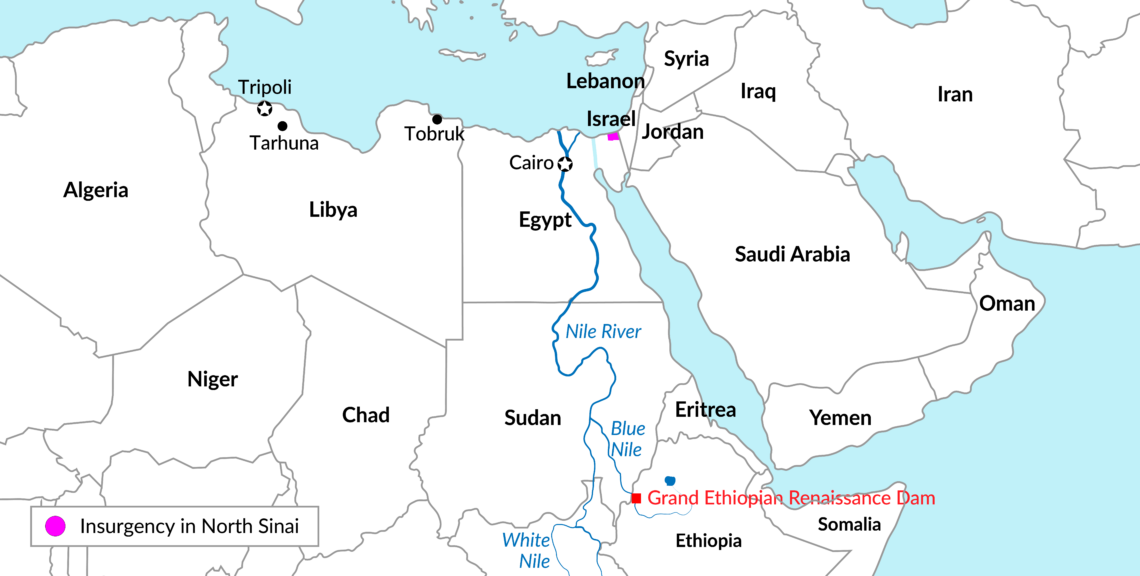Caught between the Libyan threat and the pandemic
Egypt is facing a dual crisis: The pandemic has crippled its economy, while the defeat of its Libyan ally, Field Marshal Haftar, means Cairo will need to recalibrate its involvement in Libya’s civil war. Meanwhile, additional threats loom on the horizon.

In a nutshell
- Field Marshal Haftar’s defeat in Libya dealt a blow to Egypt
- President El-Sisi also has to contend with the insurgency in Sinai
- Unsolved issue of Ethiopia’s Renaissance Dam adds the threat of drought
By the end of 2019, security and economic conditions in Egypt had taken a turn for the better. President Abdel-Fattah El-Sisi’s ally, Field Marshal Khalifa Haftar and his Libyan National Army (LNA), were poised to take Tripoli. Washington was brokering a compromise with Ethiopia over the Renaissance dam. Annual growth was expected to reach 6 percent. Before the crisis, inflation and unemployment were down, making Egypt the leading choice for investors both in the Middle East and in Africa ($9 billion in 2019). President El-Sisi’s rule was more secure than ever after changes giving him greater prerogatives were approved in a referendum.
Today the outlook is bleak. Measures imposed to stem the coronavirus severely affected the economy, while Field Marshal Haftar’s offensive in Tripoli failed. The forces of the UN-backed, Tripoli-based Government of National Accord (GNA), which includes Islamic militias linked to the Muslim Brotherhood, had a breakthrough in May thanks to Turkish support. They retook several Tripoli suburbs and the last Haftar strongholds in the western part of the country – the al-Watiya airbase and the town of Tarhuna. This defeat stunned Egypt, the United Arab Emirates and Russia, which had been giving him substantial assistance for years.
Unexpected defeat
For Egypt, it was a bitter blow. Since the fall of Muammar Qaddafi in 2011, the 1,200-kilometer border with Libya has seen a steady flow of Islamic terrorists and large-scale weapons including missiles. Explosives and military equipment looted from the enormous weapon stockpile Qaddafi acquired from Russia made their way to the Sinai insurgency. In Field Marshal Haftar, Cairo had a partner ready to help protect its border. There are economic interests as well. Before 2011, 2 million Egyptians were working in Libya, sending home remittances in excess of $1 billion per year. Today some 300,000 are left.
Facts & figures

Egypt’s cooperation with Field Marshal Haftar started in 2014 when he established the LNA in the eastern part of Libya and formed an alliance with the Tobruk-based House of Representatives (HoR), which was recognized by the International community. Cairo’s policy in Libya was backed by the United Arab Emirates, another staunch opponent of the Muslim Brotherhood. Together they supplied the LNA with arms and air support. When United States President Barack Obama suspended American military assistance, Egypt brokered a rapprochement between Moscow and Field Marshal Haftar, subsequently facilitating the transit of Russian advisors and intelligence specialists to Libya. But the LNA leader’s defeat made it clear that he lacked the strategic capability needed for sustained campaigning.
To Moscow’s ire, sophisticated Turkish drones destroyed nine Pantsir air-defense systems Russia had sold to the Emirates, which then gave them to the LNA. Worse, Islamic militias captured a tenth Pantsir and paraded it through the streets of Tripoli. Field Marshal Haftar’s fighters had not mastered the necessary skills to operate the systems – although it may also have flaws that will need to be addressed by its producers. As to the 2,000 Russian mercenaries of the Wagner group supposed to assist in training, intelligence gathering and occasionally on the battlefield, their contribution did not amount to much.
Since 2011, the border with Libya has seen a steady flow of Islamic terrorists and large-scale weapons.
Turkish President Recep Tayyip Erdogan started helping the Islamic militias in 2013 after he cut off diplomatic relations with Egypt following the ouster of President Mohamed Morsi. On several occasions, ships carrying Turkish-made weapons were stopped by the U.S. Navy patrolling the Libyan coast to enforce the arms embargo imposed by the UN Security Council. At first, there was no reaction. Egypt and the Emirates were providing armament to Field Marshal Haftar, the de facto ruler of eastern Libya.
The scope of Turkish intervention grew when, in January 2019, Egypt, Israel, Greece, Cyprus and Italy announced their intention to form a Cairo-based regional umbrella group to export gas to Europe. This was perceived by Ankara as dangerous competition for its 1,850 kilometer-long Trans-Anatolian Pipeline (TANAP) bringing Azerbaijani gas to Turkey and Europe. Hence the decision to increase the Turkish presence in Libya and put more pressure on Egypt. President Erdogan entered into an agreement with Prime Minister Fayez al-Sarraj’s government to jointly explore for offshore fields of oil and gas, as well as delimit their maritime border, effectively cutting off the Eastern Mediterranean from Europe. Greece, Cyprus and Egypt pronounced the agreement in breach of maritime law since the boundary drawn by the agreement violates the Greek Exclusive Economic Zone. The Greek foreign minister went to Tobruk to discuss a possible Greek-Libyan maritime border with the head of the HoR, which would void the Turkish deal.
Meanwhile, Turkey has been dispatching Syrian Islamic militias and drones to Libya to help the GNA. It has significant economic interests in Libya, having invested $20 billion in ongoing projects before 2011. The Chairman of the Turkey-Libya Business Council stated that Turkish companies would have a major role in the reconstruction of Libya – estimated at $120 billion – and that discussions were underway with their Libyan counterparts.
Beyond the border
Russia and Egypt probably entertained similar ambitions following Field Marshal Haftar’s initial progress, but they must now focus on mitigating the consequences of his defeat in the crisis. President El-Sisi launched the Cairo Declaration on June 6, calling for a cease-fire, the dismantling of militias, the evacuation of mercenaries and a new round of talks under UN auspices. He called on Libyan tribes, the greater part of the original population, to rise and fight “the foreign invader,” pledging to train and equip them. Tribe leaders began mustering volunteers while the Tobruk HoR asked that the Egyptian military intervene in the event of an imminent threat to the national security of both countries.
Prime Minister al-Sarraj rejected the cease-fire and claimed he was readying his forces for an assault on Sirte, a gateway to the major oil infrastructure on the LNA’s territory. President El-Sisi immediately declared that attacking Sirte would be tantamount to attacking his western border. He ordered the army to be ready for missions inside Egypt and “if necessary, beyond the border” and received parliamentary approval for the move. He also asked Arab countries for support through the framework of the Treaty of Joint Defence and Economic Co-operation of the League of Arab States. In an extraordinary online meeting on June 23, the foreign ministers of the Arab League stressed the importance of a political solution to the Libyan crisis, reiterating their support for the Cairo Declaration and their opposition to foreign intervention in Libya.
Russia deployed a number of MiG-29 fighter planes in eastern Libya and invited HoR Chairman Aguila Saleh Issa to Moscow. Russian Minister of Foreign Affairs Sergey Lavrov declared after their meeting that Russia supported an immediate cease-fire in Libya and an intra-Libyan dialogue based on the Cairo Declaration. He also announced the reopening of the Tunis-based nonresident Russian embassy to Libya, to signal that the Kremlin intended to talk with both sides. According to unidentified sources, high-ranking Russian and Turkish officers are discussing the issue in Moscow.
Will Mr. al-Sarraj ignore the warnings? Will Egypt, in dealing with this crisis, send troops deep into Libya for an open confrontation not only with the GNA, but also with Turkey? Many believe President El-Sisi would not do so unless his border is directly threatened. Since his accession, he has refrained from taking an active part in regional conflicts, even those affecting his close allies. He remains focused on the economy and on internal military matters – the insurgency in northern Sinai has not yet been suppressed.
The European Union, especially France, is responsible for the situation.
However, the Turkish intervention in Libya could tip the scales in favor of an intervention, all the more so since Ankara has been reinforcing its presence along the Red Sea. In response to what it sees as a threat to navigation through the Suez Canal, Egypt had built the largest military base in the Middle East, close to its border with Sudan.
Europe wants to see an end to the civil war; it fears that enduring chaos would bring millions of African refugees to its shores. The European Union, especially France, is responsible for the situation, having actively sought the downfall of Muammar Qaddafi. Though France sides with the LNA and Italy with the GNA, both understand the need for a political, not military, solution. Responding to Prime Minister al-Sarraj’s threat to attack Sirte, France, Germany and Italy called for an unconditional cease-fire, the end to foreign military interventions and full implementation of the arms embargo. The U.S., which has had no clear policy regarding Libya since the assassination of its ambassador by Ansar al-Sharia terrorists in September 2012, voiced support for the Cairo Declaration and a UN-led effort to bring peace; a State Department spokesperson warned President al-Sarraj not to launch military operations against Sirte. However in a July 15 phone call Presidents Trump and Erdogan “agreed to cooperate more closely, as allies, … to promote lasting stability in Libya.”
Cairo has other woes. At the last minute, Ethiopia refused to sign a compromise deal drafted with Egypt and Sudan – brokered by the U.S. and the World Bank – to set down conditions for filling the massive Grand Ethiopian Renaissance Dam built on the Blue Nile. The dam, once in operation, could threaten Egypt’s vital water supply. Egypt has hinted more than once that, faced with what it perceives as an existential threat, it would resort to military intervention. The tense standoff continues and unilateral action on the part of Ethiopia could have catastrophic results for the region. A last-ditch effort to find a compromise has been initiated by the African Union.
President Erdogan has no interest in inciting Prime Minister al-Sarraj to advance toward Sirte
Though Covid-19 is still spreading, President El-Sisi has ordered a gradual easing of restrictions to prevent economic collapse. Ailing sectors received monetary assistance. Interest rates and taxes were lowered. Egypt had to ask for emergency relief from the International Monetary Fund (IMF) and received $2.7 billion in May. Still, new sources of income will have to be found since there are no more revenues from tourism, fewer remittances from Egyptians working abroad and traffic through the Suez Canal is down. Yet, according to the IMF’s World Economic Outlook April forecast, growth in 2020 was estimated at 1.95 percent.
Scenarios
However disappointed they may be by Field Marshal Haftar’s performance, Egypt, the Emirates and Russia are not likely to abandon him. Egypt will give him the assistance he needs to withstand an eventual attack. It has the largest army of the Arab world; Mr. El-Sisi has been buying weapons on an unprecedented scale, including fighter planes and military vessels from France. Russia is supplying combat helicopters and training troops. It has also committed to provide MiG fighter planes.
The president of Egypt is getting ready for every eventuality, but given his country’s present difficulties, he has no wish to worsen the crisis with an open confrontation with Turkey. President Erdogan has no interest in inciting Mr. al-Sarraj to advance toward Sirte, where the GNA forces would face an army determined to stand its ground with the assistance of Egypt and Russia – the latter keen to make up for its failures in the first round. Ankara has no wish to openly clash with Russia. The two countries are also involved in operations in Syria’s Kurdish enclaves. There is a strategic stalemate between the warring parties, which could increase the odds for renewed negotiations.
However, it is hard to envision a compromise between the two factions. Turkey will not easily abandon its hard-won position in Libya. Only a determined joint intervention by the European Union and the U.S. would bring about this outcome. But this is unlikely; President Donald Trump has repeatedly stated that he does not want to be involved in Middle Eastern conflicts. Uncertainty will probably prevail until one protagonist or the other makes an unexpected move. As for the president of Egypt, faced with external threats, he will be hard put to maintain stability in his country if the economic crisis worsens.








